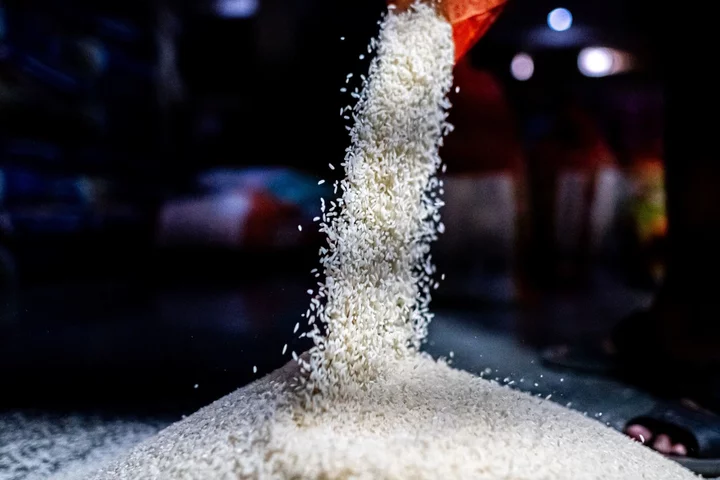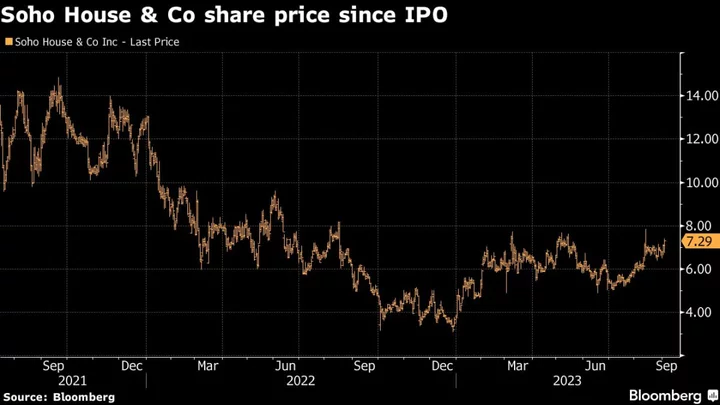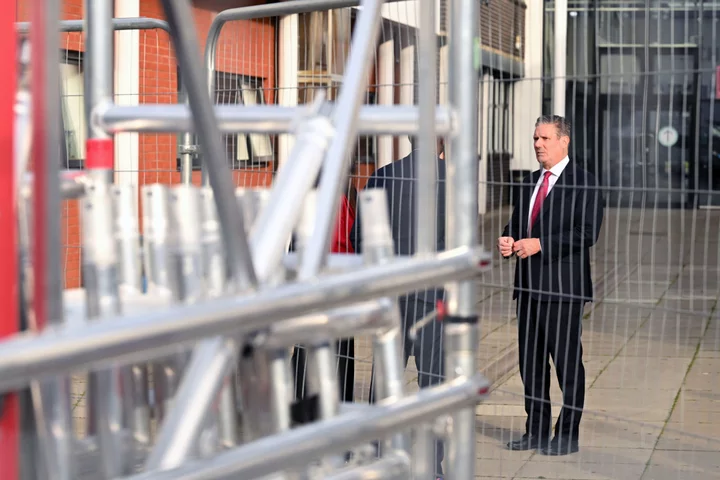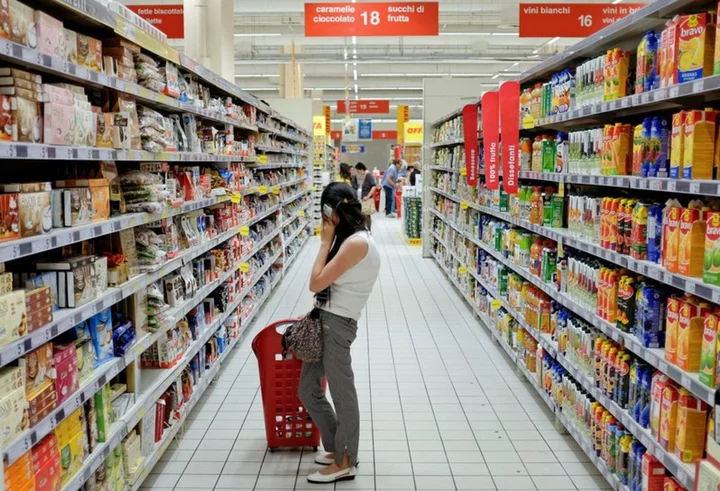
Reese Witherspoon sells her fashion brand, Draper James
Private equity group Consortium Brand Partners announced Wednesday it has acquired actress Reese Witherspoon's fashion and lifestyle brand, Draper James, through a majority stake.
2023-09-06 21:28

Cancer-hit dad who planned his own funeral defies doctors’ three-week life expectancy prognosis
A father-of-three who was told he looked like “Casper the ghost” before being diagnosed with acute myeloid leukaemia (AML) and given three weeks to live, meaning he has planned his own Requiem Mass and funeral, has defied doctors’ expectations by outliving his prognosis by more than a year and said he is going to “keep fighting”. Dennis Blackman, 62, a former chartered building surveyor and carer who lives in Eltham, London, said he has always been active – playing rugby, lifting weights, and going to the gym at least three times a week. However this all changed when he suffered an unexpected stroke in 2015. His health deteriorated over the following years, he had a hip replacement at 58, and after experiencing symptoms of extreme exhaustion, cold hands, and muscle weakness in early 2022, his wife Sally, 62, a former flooring showroom manager, suggested he book a doctor’s appointment. After weeks of blood tests and blood transfusions in hospital and being told he looked like “Casper the ghost” because he was so pale, he underwent a bone marrow biopsy, and this led to the devastating news in March 2022 that he has AML – a type of blood cancer – and three weeks to live. Dennis told PA Real Life: “I just broke down and I had this unbelievable feeling of guilt because I said to the consultant: ‘What have I done wrong? How do I tell my children and wife?’ “It’s a huge burden to put on someone, to tell them that you’re dying and it’s going to be very quick. “We had many dark days, and every time I looked into my children’s eyes I just burst into tears… it was a very emotional period for all of us.” Dennis, who has lost 50kg (7st 9lbs) since his diagnosis, did not start chemotherapy until months later due to him being too weak, and in January 2023, he was told the chemotherapy was “not working any more”. From that point on, he said he wanted to “enjoy each day” rather than pursuing more aggressive forms of treatment – and since then, he has planned his own Requiem Mass with hymns such as How Great Thou Art and Ave Maria (As I Kneel Before You), as well as the arrangements for his funeral. Now, Dennis continues to drive, go shopping, and enjoy time with his family, and he said he is going to “keep fighting” during the time he has left as “you only have one life”. “Every day you go to bed and you think: ‘Am I going to wake up tomorrow?’ And then each morning you think: ‘Is it going to be today that I’m going to die?’” Dennis explained. “It was extremely difficult in the beginning and I tried to shut the world out… but as time went on, I realised you can’t live like this forever. “You only get one life, so I’m going to do everything I can to keep fighting.” During his 40s and early 50s, Dennis said he enjoyed going out for meals with his wife Sally, playing rugby with his sons James, 37, and Joe, 31, and keeping fit by going to the gym several times a week. He foresaw spending his days in retirement with his family, out in the garden, or fishing, but he said this all changed when he had a stroke in 2015, aged 54, and his health declined from then on. In early 2022, he spent six weeks at Queen Elizabeth Hospital in London after noticing some unusual symptoms and was told: “You look like Casper (the ghost), you’re very anaemic.” He then underwent several blood tests and blood transfusions, and although he had “an idea” that he may have cancer, he said he could never have prepared himself for his diagnosis on March 31 2022. “About one o’clock, I had a knock at the door and I thought: ‘That’s ominous’,” Dennis said. “The consultant and the specialist nurse came in and they said: ‘Unfortunately it’s bad news, you’ve got severe AML and there’s not a lot we can do at this stage.’ “’You’ve got three weeks to live, and I’d advise you to go home and tell your wife and family, and make sure everything’s in order because you haven’t got long left’.” Given Dennis has severe neutropenia as well – a low number of white blood cells – he is at a higher risk of contracting serious infections, and this meant he missed several family celebrations in the months that followed, including his grandson’s birthday party and stepdaughter’s wedding. He developed multiple chest infections and fevers and was not deemed fit enough to start chemotherapy straight away, and he ended up spending three months in hospital from July to October. “We thought we were going to lose him, he was so ill,” Sally, who has been married to Dennis for 10 years, explained. “Even the consultant thought we were going to lose him. “I was scared because I just thought: ‘How can this be happening when we’ve only just met each other?’ We just thought we were going to have the rest of our lives together.” However, Dennis, who is Catholic, said he “fought and prayed every day”, adding: “I said to the consultant: ‘If you promise to me you won’t give up on me medically, I promise I’ll fight this all the way.’” Dennis was determined to get better and, with the help of a physiotherapist, he built up his strength – and at one point, he was walking 10,000 steps a day along the hospital corridor. Towards the end of October 2022, Dennis said “everything seemed hunky dory” and he commenced the first of four rounds of chemotherapy, where he experienced nausea, exhaustion, and “tremendous leg bone pain”. By January, he was told the chemotherapy was “not working”, but rather than trying other forms of treatment, he said he wanted to “enjoy the little things” and the time he has left. He has planned his own Requiem Mass and funeral to relieve any pressure from his family, but also to give him “strength” and some control over his destiny – and aside from his regular check-ups and blood tests each week, he is setting himself small milestones, such as attending a Madness concert at the O2 in December. Although he is “struggling to survive”, he said he would do “anything to get another day” – and that is why he is holding onto hope and wants to encourage others never to give up. “Even though I pray every day, not once have I asked God to take it away from me – all I ask is that He’s with me when I need him, to give me the strength to carry on fighting,” he said. “Leukaemia is painful and every day I question whether I’ll see another day, but we just try and keep going and I hope that my story gives hope to others. “I’ve still got lots of memories to make yet, so I’m going to fight this all the way.” For more information and support, visit Leukaemia Care’s website at leukaemiacare.org.uk Read More Charity boss speaks out over ‘traumatic’ encounter with royal aide Ukraine war’s heaviest fight rages in east - follow live One in 10 ‘spending beyond their means’ – try these 7 cutbacks guaranteed to save families money What is combination cholesterol therapy, as study suggests it could save lives? Cancer cases in young people ‘are rising’ – the warning signs to look out for
2023-09-06 21:27

French schools turn away girls wearing abayas as Muslim rights group challenges ban
Public schools in France have been turning away students for breaking a new national ban on the abaya, a long, robe-like garment often worn by Muslim women, as a rights group filed an appeal against the prohibition.
2023-09-06 20:53

Asean Vows to Refrain From Trade Curbs Amid Rice Supply Concerns
Southeast Asian leaders committed to keep the flow of agricultural products unimpeded and refrain from using “unjustified” trade
2023-09-06 20:24

Bill Gates made a nearly $100 million bet on Bud Light
Bud Light's parent company is having a miserable year. But there's at least one prominent investor who believes in Anheuser-Busch: Bill Gates.
2023-09-06 20:15

Soho House Wants to Crack America — and Not Just New York
Andrew Carnie spotted a curious anomaly in the three New York outposts of his membership club Soho House
2023-09-06 18:49

Edmunds: The best affordable performance cars
There’s often a point when car enthusiasts are looking to purchase their first new performance car or sports car
2023-09-06 18:46

Starmer Says Sunak Prioritized Champagne Tax Cut Over UK Schools
Rishi Sunak prioritized cutting tax on champagne rather than provide extra funding to rebuild British schools when he
2023-09-06 18:22

Italian government to meet supermarkets, small retailers to address high prices
By Giuseppe Fonte ROME Italy's government will meet with supermarkets and small retailers' associations on Wednesday to address
2023-09-06 17:52

21 best documentaries streaming now on Prime Video for when you need a good dose of reality
Most documentaries have lessons to impart and important things to say, but some of the
2023-09-06 17:50

New Thai Leader to Unleash Stimulus to Bolster Wobbly Economy Still Reeling From Pandemic
Thailand’s new government is set to unveil a number of fiscal stimulus measures next week that will include
2023-09-06 16:29

Is bottomless prosecco going to be killed off by climate change?
Picture this. The group chat has finally settled on a date and we are going out. Out out. Women of most ages know how serious this is. There was probably a spreadsheet involved. Boyfriends and husbands have been dispatched to the pub. Children and dogs have been dropped off at the sitter. Dignity has been left at the door. One of us is waiting for it to be cancelled so we can stay at home with our loungewear and girl dinners (it’s probably me). There’s only one thing for it. Bottomless brunch. Many Asos orders and outfit changes later, we arrive, take our seats and start the binge drinking timer. There’s only one problem. No prosecco. Freshly manicured fists pound the table. The elected Karen of the group starts to verbally pulverise the staff. Eggs Benedicts are thrown against the walls. The Prosecco Huns exclaim in unison: “But what are we going to drink now?!” The waiter bashfully suggests: “Spumante?” Give over. According to a new study, this could be a reality in the near future thanks to climate change threatening vineyards across Europe, in particular those dedicated to glera (the beloved prosecco grape) in Northern Italy. In a detailed report in iScience last month, researchers warned that unpredictable weather, soil degradation and drought could lead to the loss of a millennia-old winemaking tradition, and the livelihoods attached to it. RIP the Prosecco Hun. The Italian sparkling wine has long been the fizz of choice in the UK (we were only dethroned as the world’s biggest prosecco guzzlers last year by the US). In the early 2010s, more than a third of all the prosecco shipped out of Italy worldwide ended up in Britain – approximately 131 million bottles a year. That’s nearly two bottles per Brit. You get the idea. The origin of our obsession with prosecco dates back to just after the 2008 crash, when consumers were looking for an alternative to expensive champagne. The softer tasting, far more affordable (thanks to its cheaper and speedier production time) and incredibly quaffable prosecco was the obvious choice. Bottomless brunch was born. “My heart goes out to the huns whose weekends simply aren’t complete without a bottle of prosecco,” Hannah Crosbie, founder of Dalston Wine Club, laments at the news that just 15 years after it stormed onto supermarket shelves, prosecco might be quietly forced to say arrivederci. “In all seriousness though, climate change is seriously threatening every aspect of winemaking, and growing conditions are only getting more challenging.” Prosecco is certainly not the only vino at risk, but it faces a unique issue. Where other wine growing regions affected by climate change such as Champagne and Burgundy can simply put out a limited run with an inflated price tag and keep the snobby oenophiles coming, prosecco’s USP is its ability to produce in bulk and at a fraction of the cost. English sparkling is a big winner with the climate going the way it is. Prosecco, by all accounts, seems like it’s a bit of a loser in that regard Will Amherst, head wine buyer at Trullo Ali Finch, group sommelier at Angela Hartnett’s Michelin-starred Italian restaurant Murano in Mayfair, doesn’t believe there’s an appetite for a higher quality, more expensive prosecco. “With the impact of the climate as well as the cost of producing wine increasing, the challenge for prosecco is going to be how to balance the expectation of its price point with the need to make slightly smaller quantities,” she tells me. “Regions like Chablis, for instance, have had multiple horrible vintages back to back and people just accept the fact they have to pay more for it if they want to drink that wine.” For the uninitiated, the word “vintage” on a wine label simply means the year the grapes were harvested – compared to regular wines that may include grapes harvested in multiple years – and each vintage can taste vastly different based on the conditions affecting the grapes in that year. Chablis, produced from chardonnay grapes in the northernmost district of Burgundy, has always been particularly affected by the climate due to its geography, but in recent years has seen frost in 2016, 2017 and 2021, and drought and higher temperatures in 2019 and 2020. This has dramatically affected those vintages, and driven up the price of bottles from “good” years. But with prosecco, “people potentially wouldn’t be interested in” paying a higher price, Finch says. This is partly because its brand has become more associated with cheap fizz than fine wine in Britain. Part of the problem also lies in the simplicity of its production. Prosecco is a wine that reflects the aromatics of the grape at the point of harvest, whereas with other sparkling wines like champagne, as well as other types of wine in general, such as chablis, it’s about the ageing process. Rising temperatures mean grapes are ripening more quickly, which can result in a different flavour of wine or too much alcohol, so one option is to harvest the grapes earlier. You can get away with a slightly under-ripe fruit in aged wines as so much of the flavour is added during their long fermentations. In prosecco, a bottle of which is ready in just 30 days, an under-ripe grape could result in something that “tastes a lot like battery acid”, according to Finch. The Prosecco Huns don’t want to chug something flavourless and eye-wateringly alcoholic with their eggs Benedict. “If you pick too early, you’ve got no flavour,” Finch explains. “So they don’t really have the option to just keep making it in the same volume. With other wines, you can do more work in the winery to make the wine feel more balanced and more approachable and more complex. They don’t have that luxury in prosecco.” Under Italy’s DOC (Denominazione di Origine Controllata) laws, prosecco is only prosecco when it comes from just two regions of the country, Veneto and Friuli-Venezia Giulia, and adheres to strict growing and production rules. The same goes for champagne: only wine produced from eight permitted varieties of grape grown exclusively in the Champagne region of France may be called champagne. It’s these “heroic viticulture” sites that the report says are most at risk. Naming rights have been a point of contention across the whole wine industry for some time, with Australian producers of glera recently putting in a request to the EU to be allowed to call their wine prosecco on the grounds that it’s part of their migrant and cultural identity. Ironically, the glera grape is actually believed to be Slovenian in origin, and was first cultivated in the vineyards of Prosecco, a small village in the Friuli-Venezia Giulia region near the border with Slovenia. The name is even thought to derive from the Slovenian words preseka or poseka, or the Serbian/Croatian prosek, meaning “path cut through the woods”. While DOC laws might prevent anyone calling a sparkling wine made from glera grapes outside of the designated regions a prosecco, it hasn’t stopped winemakers around the world from essentially producing the same wine using the same techniques. As climate change has made it increasingly difficult to cultivate the grapes in their historical home, it’s also made conditions in more northern regions like the UK more favourable for the growing of certain grapes, including white varieties such as glera, opening the door to a whole new generation of winemakers. “This is not me saying this is the death of prosecco,” Finch adds quickly, but she stresses that the wine industry is naturally very dynamic. “There are loads of alternatives to prosecco, both within Europe in terms of pet nats and cremants and things like that, and with the New World as well.” Pet nats – sparkling wines made using the “traditional method” of fermenting in individual bottles – have become very trendy among the younger Gen Z crowd, she says, as it still offers something bright, fruity and super fizzy, but without the faff, or price tag, that comes with champagne. People are also drinking less but are happy to spend a little more and not drink as much. At Murano, Finch says diners are asking about English sparkling wines more than ever before. “The correlation, obviously, with post-Brexit is there. There’s a desire to try and drink more local wines, potentially from a sustainability point of view, potentially from a cost-to-quality point of view because of duty increasing. It’s also partly because during Covid people did a lot of staycations and UK wine tourism did very well during that time. And it sort of stuck.” It’s a sentiment echoed by Will Amherst, head wine buyer at Italian trattoria Trullo in Islington, north London. “I don’t want to bash prosecco too much, but if I was going out and I wanted sparkling wine, I would still look at champagne,” he says, much to the chagrin of the Prosecco Huns. “And if I’m going to look somewhere other than that, I would get a bottle of English sparkling. Because English sparkling is a big winner with the climate going the way it is. Prosecco, by all accounts, seems like it’s a bit of a loser in that regard.” Prosecco and the people that produce it are certainly not the only losers but its high-altitude, cooler temperature geography, which previously protected it from climate change, is now adversely affected by extreme weather. Sudden, intense rainfall damages the soil and creates “slope failures”, while conversely droughts make irrigation extremely difficult. While he’s yet to see a knock-on effect on prosecco supplies at Trullo, Amherst’s “immediate thoughts were, really sadly: is prosecco going to be able to pull itself out of that hole? I don’t know how you reconcile the spiralling production costs and the brand identity, which is synonymous with cheap wine in this country,” he says. Although it’s not recommended to keep prosecco longer than two to three years before it goes flat – compared to up to 10 years for vintage champagnes – he doesn’t anticipate stocks to run down soon. At any rate, his biggest use for prosecco at Trullo is in an Aperol Spritz, where it makes up half the drink. He actually sees it as an exciting opportunity for new wines to emerge. So does Will Hill, a wine buyer at online merchant Honest Grapes, who tells me: “Once again, cava is showing that there is great value to be found in traditional method sparkling wines and more and more we are seeing ‘prosecco-esque’ wines for lower prices. If the consumer isn’t tied to the name ‘prosecco’, there are plenty of good, affordable, entry-level options available.” It’s clear that wines of all colours are facing an uphill battle (quite literally in prosecco’s case), not just to survive but to protect their identity, which for prosecco is arguably more important. That could spell the end of the Prosecco Hun, but with English sparkling and other European varieties on the rise, perhaps it just means a rebranding is in order. Cremant Crew? Pet Nat Posse? They don’t have quite the same ring, but it won’t stop us booking bottomless brunch anytime soon. Read More I feel it in my fingers: Why more of us should start eating with our hands Pizza, cake and meringue martinis: When did cinema food get so silly? Michelin-starred chef Simon Rogan on 20 years of L’Enclume: ‘It all started with a radish’
2023-09-06 15:29
